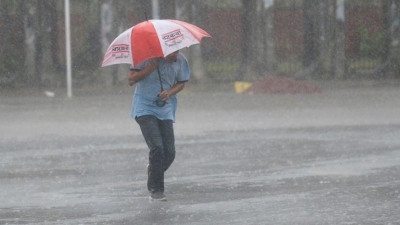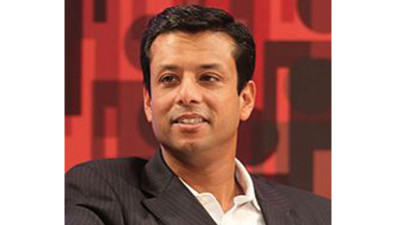 Bonik Barta graph
Bonik Barta graph A significant chunk of the country’s development spending
comes from foreign loan assistance. The government’s spending on repayment of
interest and principal amount is gradually increasing. According to information
from Economic Relations Division (ERD), different countries and donor
organizations released $5.63 billion ($1 equals to Tk 117) in favor of
Bangladesh in the first three quarters (July-March) of ongoing 2023-24 fiscal
year. During this period, the government had to spend $2.57 billion on the
repayment of interest and principal. Based on this calculation, nearly half of
the loans (about 46%) released in first nine months of current fiscal was spent
to repay the loan installments (interest and principal).
Economists think that the pressure of repaying foreign loans
will increase in coming days. They are of the opinion that installments of loans
taken for quite a few mega projects will begin. In that case, the amount of released
loan money and repayment of interest and principal could even be nearly same.
During July-March period of 2022-23, foreign loans of $5.36
billion were released. At that time, $1.73 billion was spent to repay interest
and principal which represented over 32 percent of the released money.
ERD statistics indicate that the repayment of interest and
principal happened at a faster pace than that of release of loans in the first
three quarters of the fiscal. Out of the repaid money in nine months, interest
accounted for $1.05 billion. During the same period of the previous fiscal
(2022-23) the interest payment stood at $485.9 million. The payment of
principal amount in the first nine months of the current fiscal was $1.52
billion while during the same period of the previous fiscal it was $1.24
billion.
The government is spending more on importing and repaying debt
than earning foreign currency, including from remittance and exports. As a
result, foreign reserve cannot reverse the downward trend. According to the
updated information of Bangladesh Bank, as of Thursday, the gross foreign
reserve of the country, as per the central bank’s own calculation, stood at
$25.27 billion. However, according to BPM6 mechanism, which is regarded as international
standard, Bangladesh’s reserve stands at $19.82 billion.
The pressure to repay the debt taken for implementing mega
projects has been gradually increasing over the last few years. Experts fear
that this pressure will further intensify once the debt repayment of Rooppur
power plant, Matarbari power plant, Metrorail and Karnaphuli tunnel will begin.
Till now, highest amount of loans in history of the country were taken for the
projects in power and energy sectors. Of them, Bangladesh signed a loan agreement
to take a staggering $11.38 billion for the construction of Rooppur power
plant. The repayment for this loan will commence on March, 2027. Of course, ERD
in March formally requested Russia to defer the commencement of loan repayment by
two years (March, 2029).
The government has taken out loans from the International
Monetary Fund (IMF) in order to ensure foreign currency to repay foreign debt. Bangladesh
has already received the second tranche of $4.73 billion loans. An IMF
delegation has just concluded a visit to Bangladesh to discuss the release of
the third tranche. The global lender is asking Bangladesh to carry out different
reforms in order to get the loans. As parts of the reforms, IMF advised the
government to be strict in earning revenue, including withdrawal of subsidy in
power sector, return of defaulted loans and introduction of crawling peg
system.
“The maturity period of loans taken for few projects is going
to begin. The repayment of interest and principal has begun. It is increasing
gradually and in future this will go up even more. Reserve is going down, but
the repayment of interest and principal is up. If the situation is not like
this, our economic scenario could have been different,” Dr Mustafizur Rahman,
distinguished fellow of Centre for Policy Dialogue (CPD), told Bonik Barta.
He also said, “We are repaying the debt by selling services,
electricity and gas as well as by collecting toll on the highways. The main
reason for the increase in spending is the rise exchange rate. We need good
governance to get out of this. We will have to opt for projects that are
financially profitable to avoid big debt in future. Alongside, effort must be
on to enhance the reserve through remittance and export earnings.
Majority of the country’s development infrastructure is being
implemented with the foreign assistance. Different projects are being
implemented subject to the availability of overseas aid. The size of annual
development program (ADP) in 2022-23 fiscal was Tk 2.63 trillion. It was
downsized to Tk 2.45 trillion due to the failure to spend money. Of the amount,
the target of foreign loans was Tk 940 billion. In the revised ADP, the targeted
foreign loans also went down to Tk 835 billion. A target of taking foreign loans
of Tk 1 trillion has been set for ADP for the upcoming 2024-25 fiscal. The
amount is the highest in the country’s history.
For the release of less amount of foreign loans, economists
blame the slow pace in implementing the projects. They say that significant
chunk of the foreign loans comes centering the projects. Therefore, reforms are
needed to fix this.
“Foreign aid already in the pipeline is not coming to the
country due to lack of our capability. It would have been possible to get more
of the promised money released if there was more pace in implementing the
projects. This would have decreased the repayment of debt against the released
money. So, structural reforms are necessary for increased capacity,” Mohammad
Muslim Chowdhury, former Finance Secretary and Comptroller and Auditor General
(CAG), told Bonik Barta.
ERD data show that World Bank, Asian Development Bank (ADB)
and Japan pledged the maximum amount of loan assistance in first three quarters
of the current fiscal. The World Bank pledged $2.62 billion and released $1.4
billion. ADB promised $1.42 billion and released $967.3 billion. The promised
and released money from Japan was $2.04 billion and $1.36 billion respectively.
MA Mannan, Chair of the Parliamentary Standing Committee on
Ministry of Planning, was not immediately available for comments.
But, he told Bonik Barta recently, “We hope that in the coming
days not only debt, earnings will also go up. Economy is expanding, growth is
taking place. Earnings will also increase. We have invested a lot in
infrastructure and expect a good return from that. And, we are already getting
some return.”
“But, we have to remember one thing. We borrowing in dollars,
but earning in takas. Now, we have to increase earnings in dollars. That means,
earnings will have to be increased through diversifying exports. Alongside, remittance
should be enhanced,” he said.







